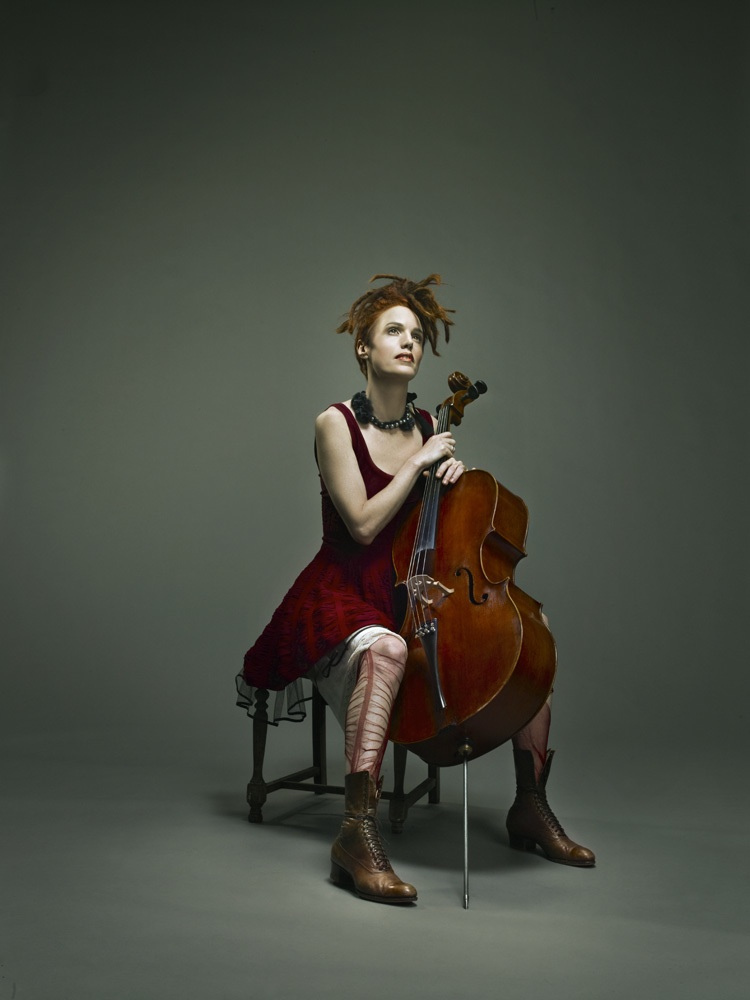Zoë Keating blends software and strings for an experimental edge
By Joshua Brazee
Giving up your day job as a software designer to follow your passion as a cellist would frighten anyone. It is not a decision made lightly as your optimism must surmount your fear of starving. Zoë Keating knows what this tough transition is like. After losing her job in the tech industry, Zoë took it as a sign to explore what she could make of her passion. No stranger to technology, she created her own brand of music by masterfully blending old and new – creating looping, layered pieces with her skills as a classically trained cellist.
“I had a great job and built up a career in the tech industry, but I kept playing music and played in many bands during this time. Then there was the ‘.com’ tech crash… I was out of a job,” said Zoë. “I woke up and asked, ‘What am I doing?’ It was a wake up call, and it took a great deal of time to get back to doing what I loved.”
Launching a career in music, however, is easier said than done. Zoë had to weigh her options before she settled on being an independent artist rather than choosing a record label. She also had to juggle a few jobs at first to make it work.
“I didn’t fit into any mainstream music genre, and because of that, the only way is to do it yourself,” said Zoë. “With established industry pop, they try to mold you. I wasn’t willing to compromise my art and that meant being independent.”
Zoë’s “.com” problems hadn’t completely disappeared. In the digital music age of iTunes, Pandora, Spotify, Youtube, and rampant digital piracy, making a living from your music has become more difficult. Though reaching fans digitally may be easier, the need for listeners to pay for music has waned. Streaming services offer premium plans for which one must pay, yet they also allow users to listen to the music for free, leading to meager earnings for smaller names. With Zoë’s newly declared autonomy came more challenges. She had to grapple with managing the business side of making music herself – a task usually left to managers and record labels.
“I never anticipated how much business there was [in making music]. I had never run a business before and I didn’t anticipate all the administrative things – from promoting concerts to maintaining a website, booking shows, taxes, and more,” said Zoë.
Although there are numerous hurdles Zoë had to jump over to successfully manage her career, there are significant advantages to having direct control of her music by handling all of the business herself.
“Part of this story is that there is a lot of music out there and stuff to spend money on. It’s an important part of my story to connect directly with listeners,” said Zoë.
Zoë also sees a developing artistic ethic in direct marketing and competition. Having access to a smaller portion of a more diverse pie means working toward “a slow, sustainable career.” Sustainability is often what is lacking in the work of mega-pop stars who cater only to brief moments and fads.
“Now I’ve been encouraging other artists. It’s important to work on art and not change it for other people. I think artists can do it on their own but lower their expectations – you can make a living with 10,000 fans. I’d rather see thousands of artists making art for the right reasons, rather than a handful of megastars doing it for the wrong reasons.”
But Zoë’s work has only just begun. The “new-model artists,” as she calls musicians like herself who aren’t signed to a label, need to create the framework through which direct digital marketing can survive. She has blogged extensively about artist rights and streaming services, even soliciting comments and feedback from her piece, “Toward a Manifesto.” Keating is on the frontlines of a revolution, and in the face of misunderstanding, misrepresentation, and sometimes fierce opposition.
“If we don’t like the world we live in, it’s up to us to either change it, or change our perception of it. Beyond contributing music, I feel like can’t do much about pointless wars, or climate change, or mass shootings, or all the other huge issues in the news every day, but I feel like I might be able to do something about this tiny little streaming thing,” she writes her her “Manifesto.”
Though her experimental “avante-cello” music is worlds away from the pop anthems all over the radio, it glows with originality. Zoë says that pursuing music was an organic transition, given her exposure to computers and simultaneous exploration of cello music.
“It didn’t seem strange. It [her tech job] definitely made computers less scary […] It just so happens that my career has taken the same path,” said Zoë. “What I’m doing couldn’t have been done ten years ago. Computers are getting better and better and better. It’s amazing what we can do with computers on stage.”
Zoë’s compositions seamlessly integrate the beauty of the modern machine and the classicism of cello, giving her live performances an experimental edge. Using Ableton Live software, Zoë places microphones on her cello to capture the sounds, while simultaneously organizing complex arrangements live with a pedal. The computer-pedal-cello combination allows her to “fade it down, pan it to the left, backwards, pan to right, and keep adding layers” to her music.
“In the studio, I take parts I like and work with them. I recorded parts and arrange them in little pieces. It takes a long time,” said Zoë. “On stage, I’m doing everything at once. Part of the challenge is doing something wrong and then saving the piece on the fly. I practice really hard to make things perfect. But once I stopped worrying about perfection, it freed me creatively.”


